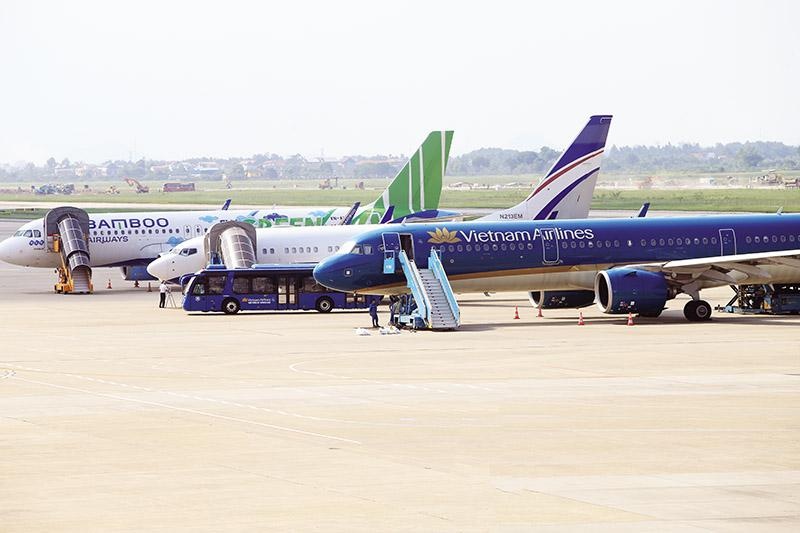Creating credit mechanism essential for banks to support the aviation industry
 |
| Thirsty airlines need urgent capital support to enhance liquidity |
The government's new Resolution No.105/NQ-CP on supporting businesses, co-operatives and trading households in the context of the pandemic, directs the State Bank of Vietnam (SBV) to work with relevant agencies to soon put forth mechanisms on credit support, helping local airlines to boost liquidity, ensuring resources for continued operation and development.
According to Bui Doan Ne, general secretary of the Vietnam Aviation Business Association (VABA), albeit the airlines’ revenue halved in 2020, the situation was even more critical this year, with international passenger transportation taking a plunge of 98 per cent.
Amid plummeting revenue streams, the airlines have to fork out more than VND100 billion ($4.35 million) a day on aircraft leasing and maintenance, and wages for crew members and associated staff. This has made many airlines face negative money streams with dwindling liquidity.
| The aviation sector, therefore, is happy with the new resolution and expect the supportive measures would soon be introduced to uphold airlines’ rebound efforts. |
The aviation sector, therefore, is happy with the new resolution and expect the supportive measures would soon be introduced to uphold airlines’ rebound efforts.
Earlier, the VABA has proposed the government to ask for the National Assembly's permission to apply capital refinancing mechanism to airlines, leveraging the scale, market share, role, and particular contribution of each airline.
The VABA has also requested a preferential credit package valued at around VND25 trillion ($1.1 billion), with 4 per cent annual interest for a duration of 3-5 years.
In fact, the overdue and due debts of local airlines have amounted to nearly VND40 trillion ($1.74 billion) and the national flag carrier Vietnam Airlines even had negative equity. it will take until late next year or even early 2022 that the aviation industry can be rebooted.
The government’s guidance on providing credit support to airlines was therefore hailed by economists.
Can Van Luc, member of the National Financial and Monetary Advisory Council, said that as aviation has high spill-over effects with a decisive role in maintaining supply chains and serving people’s essential needs, a credit support mechanism to rescue this sector is a necessity. On the global scale, many countries have splashed out several hundred billion dollars to support the aviation industry in the past two years.
In Vietnam, however, support for the aviation sector is limited. Many solutions being deployed in other countries have yet to be applied in Vietnam, such as allowing airlines to carry forward losses from business activities in 2020-2021 to subsequent years, or providing loans to support liquidity (only Vietnam Airlines has received this support).
Expert Can Van Luc said that based on market share factor, it is reasonable for the government to consider refinancing level at around VND4 trillion ($173.9 million) for private airlines like Vietjet or Bamboo Airways. With this loan level a 3-year term at most, total supportive budget would approximate VND480 billion ($20.87 million) which is acceptable.
The government’s resources to support airlines’ refinancing scheme, is however, limited and the airlines’ loan requirements reach several dozen trillions of dong (several hundred millions or even billions of dollars). The experts, therefore, assumed that it is important to have in place a suitable credit mechanism for banks and airlines to work together on loaning conditions.
Luc commented that the airlines’ proposal on waiting a VND25 trillion preferential credit package from banks with 3-4 per cent annual interest rate for 3-5 years is unfeasible, as with these interest rate banks would definitely lose.
According to VABA general secretary Nguyen Quoc Hung, while airlines require tremendous loans, banks cannot lend them. That is because in light of the Law on Credit Institutions, borrowing businesses must present feasible business plans for repayment. While aviation remains almost completely frozen, banks will be unlikely to see viable business plans.
“The interest rate is not the biggest issue. Most importantly, we need to work out a mechanism to fix the paradox, helping airlines to access capital sources,” said Hung.
Albeit advocating the government’s approval on credit provision to support airlines, economists urged airlines to present rebound plans with concrete commitments to prove they deserve the support, such as commitments to maintain employee count or to use ecofriendly fuel after the rebound.
What the stars mean:
★ Poor ★ ★ Promising ★★★ Good ★★★★ Very good ★★★★★ Exceptional
Related Contents
Latest News
More News
- Private capital funds as cornerstone of IFC plans (February 20, 2026 | 14:38)
- Priorities for building credibility and momentum within Vietnamese IFCs (February 20, 2026 | 14:29)
- How Hong Kong can bridge critical financial centre gaps (February 20, 2026 | 14:22)
- All global experiences useful for Vietnam’s international financial hub (February 20, 2026 | 14:16)
- Raised ties reaffirm strategic trust (February 20, 2026 | 14:06)
- Sustained growth can translate into income gains (February 19, 2026 | 18:55)
- The vision to maintain a stable monetary policy (February 19, 2026 | 08:50)
- Banking sector faces data governance hurdles in AI transition (February 19, 2026 | 08:00)
- AI leading to shift in banking roles (February 18, 2026 | 19:54)
- Digital banking enters season of transformation (February 16, 2026 | 09:00)

 Tag:
Tag:


























 Mobile Version
Mobile Version